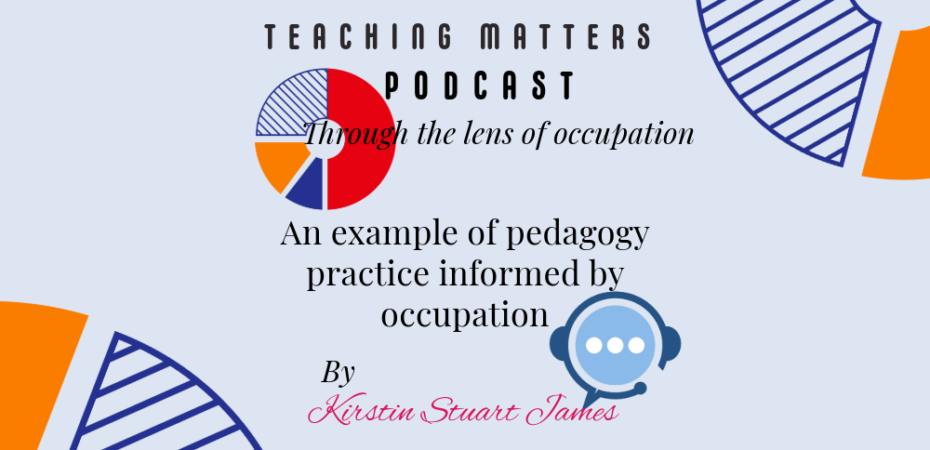
In this podcast episode, Kirstin Stuart James an academic and occupational therapist, shares the inspiration for her blog series. She discusses the link between her roles, offering a practical example of curriculum transformation through a pedagogy of occupation. This post belongs to the Hot Topic series: Through the Lens of Occupation↗️.
Kirstin begins this podcast episode explaining the inspiration behind the blog series and what this podcast episode aims to deliver. The blog series explores the impact of higher education on human health, offering a potential pedagogy of occupation framework and considering AI and sustainability in the context of occupation.
Human occupations, occupational disruption and occupational marginalisation:
Kirstin goes on to explain what human occupations are, what occupational therapists do and how they are regulated here in the UK. Also, she expands on what occupational disruption, dysfunction and marginalisation mean.
She defines occupation as “the things that we do, need, want, or have to do”, including activities for self-care, productivity, and leisure.
“The things that we do to look after ourselves, for example, eating, cleaning our teeth, taking a shower, getting dressed, sleeping; they are the things that we do to earn a living, for example, working/ other ways of being productive through our day such as volunteering; they are the things that we do for the sake of them; they’re all leisure activities, for example, going for a walk, being out in nature and being creative – those are all occupations”.
“The occupations that people do are really the things that make us us – the things that also drive us, the things that motivate us, and also that are the ways that we maintain our health”.
Kirstin explores the impact of occupational disruption, noting that
“when we cannot take part in occupations that are meaningful… that’s called occupational disruption”.
She discusses “occupational marginalization”, where individuals are excluded from significant occupations, as seen in higher education when financial barriers prevent participation.
In discussing the link between health and education, Kirstin introduces a framework for pedagogy of occupation, referencing Eklund et al’s model (discussed in blog 2)↗️ that seeks to understand how a pedagogy of occupation could make sense of teaching and learning occupations and their links to health. Also, laid the groundwork for understanding the role of meaningful occupations in supporting health and addressing the negative impact of marginalization or disruption.
A practical example of curriculum transformation from the MSc Clinical Education program:
I’m hoping that this particular podcast has made some extra sense of thinking about the pedagogy of occupation and that the blog series and the podcast, taken together might provide a different way of thinking about learning design, of thinking about teaching, and thinking about the context in which teaching and learning is taking place.
Time stamps:
(2:46) Inspiration behind the blog series and podcast episode
(4:50) Human occupations, occupational disruption and occupational marginalisation
(9:41) Framework for pedagogy of education: Links between Health and Education
(12:09) A practical example of curriculum transformation from the MSc Clinical Education program
(19:15) Conclusion
Transcript of the podcast episode↗️.
 Kirstin Stuart James
Kirstin Stuart James
Dr Kirstin Stuart James is currently on secondment as Deputy Programme Director within the Clinical Sciences Teaching Organisation, part of the College of Medicine and Veterinary Medicine at University of Edinburgh. As her substantive post, Kirstin is Senior Academic Coordinator/MSc Year Lead in Clinical Education where she teaches on online distance learning programmes for those involved in undergraduate and postgraduate education across the health and veterinary professions. She is a Senior Fellow of the Higher Education Academy. Kirstin is also a Senior Occupational Therapist in Urgent and Emergency Care with NHS Lothian. Kirstin is interested in the links between health and education, and how an understanding of occupation and occupational therapy can enrich teaching, learning and educational design, and support health though education. You can find Kirstin on Twitter (X) at @TherapyStatim↗️.
Episode produced and edited by:
 Sylvia Joshua Western
Sylvia Joshua Western
Sylvia is currently doing her PhD in Clinical Education at The University of Edinburgh and has a Master’s degree in Clinical Education. Her PhD research explores test-wise behaviours in Objective Structured Clinical Examination (OSCE) context. Coming from a dental background, she enjoys learning about and researching clinical assessments. She works part-time as a PhD intern at Teaching Matters, the University’s largest blog and podcast platform through Employ.ed scheme at the Institute of Academic Development.
Twitter/X: @sylviawestern↗️


